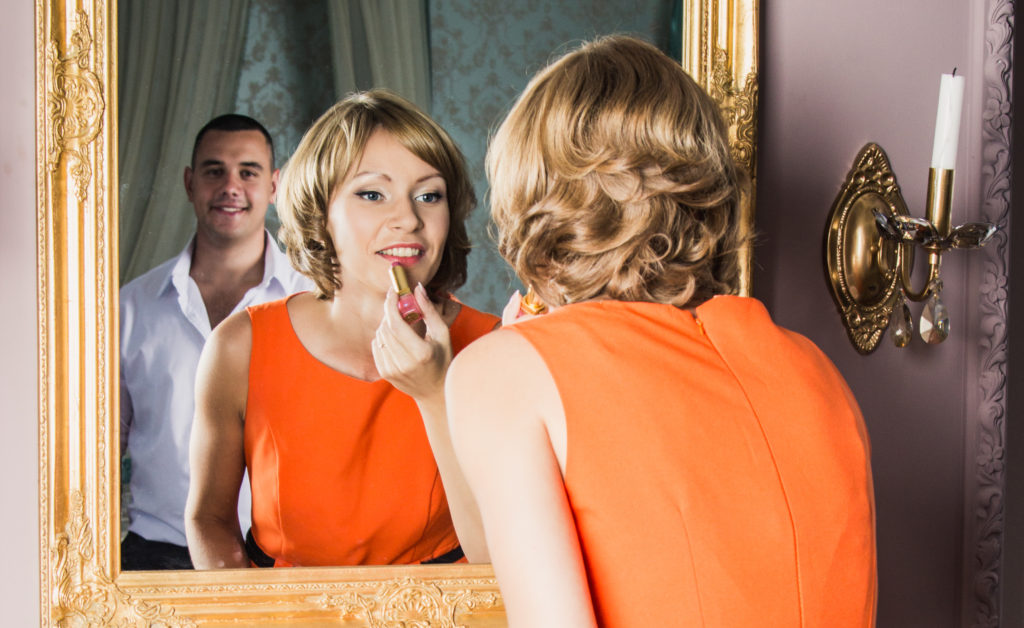[custom_frame_center] [/custom_frame_center]
[/custom_frame_center]
The third, and concluding, part of this series is a candid look at mirrors, realistic expectations and self-awareness.
“Erised stra ehru oyt ube cafru oyt on wohsi” – inscription on the Mirror of Erised in Hogwarts
The mirror is the most deceptive piece of furniture you own. Some people flock to a mirror, some turn away. A mirror often shows you what you want to see and not always what is really there. The Mirror of Erised in Harry Potter’s world defies the deceptive mirrors of the Muggle world – “I show not your face but your heart’s desire” (its inscription written backwards). Perhaps that is why, as Professor Dumbledore explains, people wasted away in front of that mirror as they longed for their heart’s desire. If they could not identify that desire, they were even more passionate about seeing and being near it.
To really know oneself yields a lifetime of exploration. Counseling, self-help books, prayer, a revelation from Briggs Meyers…any personal concoction of learning your own mind and heart. So say you get to the place where you think you know yourself. You’re ready for your close-up and to see another image in your mirror of two smiling faces, brimming with love and the prospect of a happily ever after. Once you have a wonderful partner, do the faces you see reflect your true heart’s desire?
Watch that mirror. Are you seeing what you want to see or what is really there? Alain de Botton, author of “The Course of Love” gives some mind-blowing psychology behind why we (usually) marry who we marry. He says you probably married someone who helped recreate a familiar feeling/environment from your childhood. If you had a relatively healthy childhood, you probably had a good shot at recreating a healthy marriage. (Note: marriage takes a lot of effort, even if you had the greatest parents on Planet Earth, so nobody gets off easy). If you came from an unhealthy childhood, you might be recreating the chaos, simply because that’s what you know. de Botton says marriage as the recreation of childhood feelings (and the emphasis on unsustainable romantic feelings) is why so many people get divorced. Is that your 15-year-old self in the mirror, daydreaming of Prince Charming? Do you become the Evil Queen at the first sign of marital conflict? Or have you been married for a decade and the dragon is starting to look more appealing than your prince?
de Botton says self-awareness and realistic expectations keep a marriage alive, “We should learn to accommodate ourselves to “wrongness,” striving always to adopt a more forgiving, humorous and kindly perspective on its multiple examples in ourselves and in our partners.” And here’s a truth that you won’t find in any Disney movie: “There can be no end to our sense of emptiness and incompleteness.” How can that be? Where’s the “You complete me” promise? Wasn’t that in the marriage vows? (It wasn’t.) When you speak words of completion, their responsibility falls onto your heart and soul. Completeness is never found in someone else, or on this earth, for that matter.
He goes on to say that a sense of incompleteness and some incapability is normal. In other words, nobody’s perfect: “Choosing whom to commit ourselves to is merely a case of identifying which particular variety of suffering we would most like to sacrifice ourselves for.” Now you’re adding on suffering? I KNOW that wasn’t in the vows. Reality check: Marital problems are rarely one-sided. It’s in times of difficulty that we push the mirror away because seeing our own accountability is too hard to take. Maybe looking at our own smugness or fear of what we would see if we looked long enough, is what is blurring the image of the happy faces.
So we aren’t looking for perfection in a spouse (because we have to admit we are not perfect). de Botton says, “Compatibility is an achievement of love; it must not be its precondition. We should learn to accommodate ourselves to “wrongness,” striving always to adopt a more forgiving, humorous and kindly perspective on its multiple examples in ourselves and in our partners.” Nobody’s perfect, so are the issues you are having really belong to your partner or to you?
No matter what type of marriage you have, both sides have to be willing to make it work. A healthy, happy marriage is a gift. Glamour magazine contributor Kim Caramele penned a great article about being happy in your marriage. In “I Don’t Want Your Marriage Advice,” (Glamour, August 2016) she addresses the judging that comes when you actually admit you are loving your spouse…on a consistent basis. “It’s not always easy to talk about being happily married – you risk coming off as braggy or preachy. It’s far more acceptable, in fact, to engage in all-out trash-talking sessions with friends about the annoying things your significant other does.” Trash-talking leads to an ugly picture in the mirror – every time. Continually working on making yourself better makes a better marriage. It doesn’t make it perfect, but at least you know you are doing your part as a committed, engaged partner. That is a realistic goal that makes it easier to look at yourself in the mirror at the end of the day.
By: Melissa Hardin Baysinger


